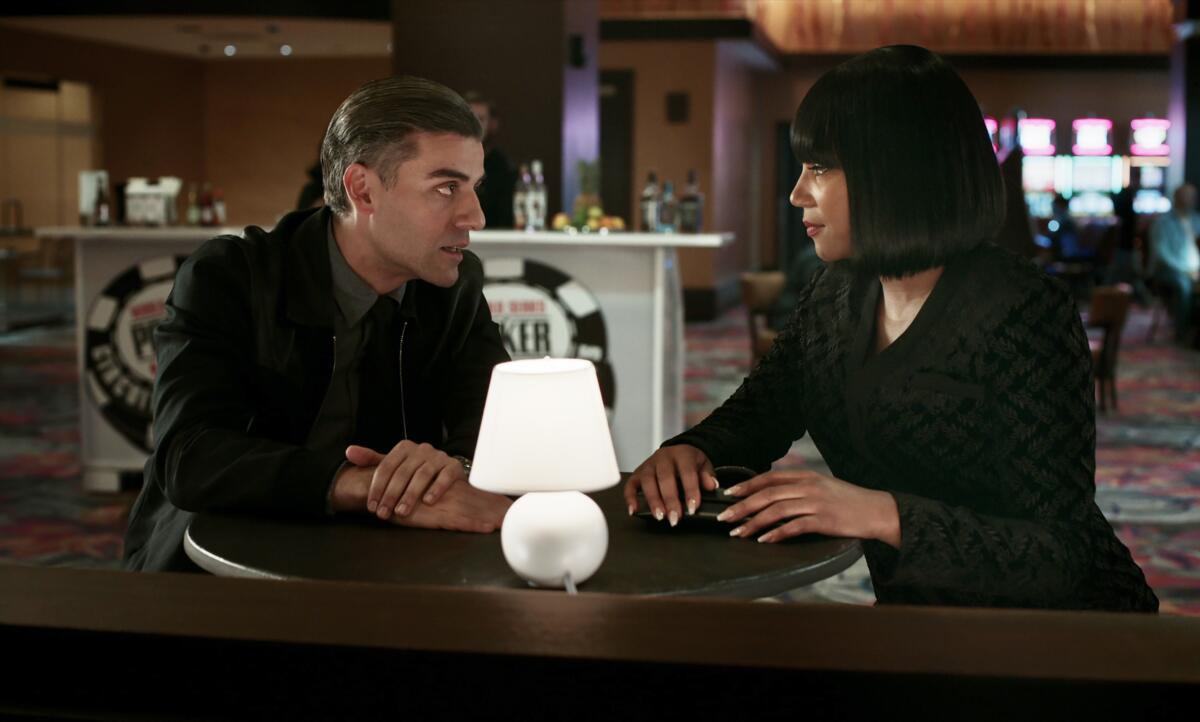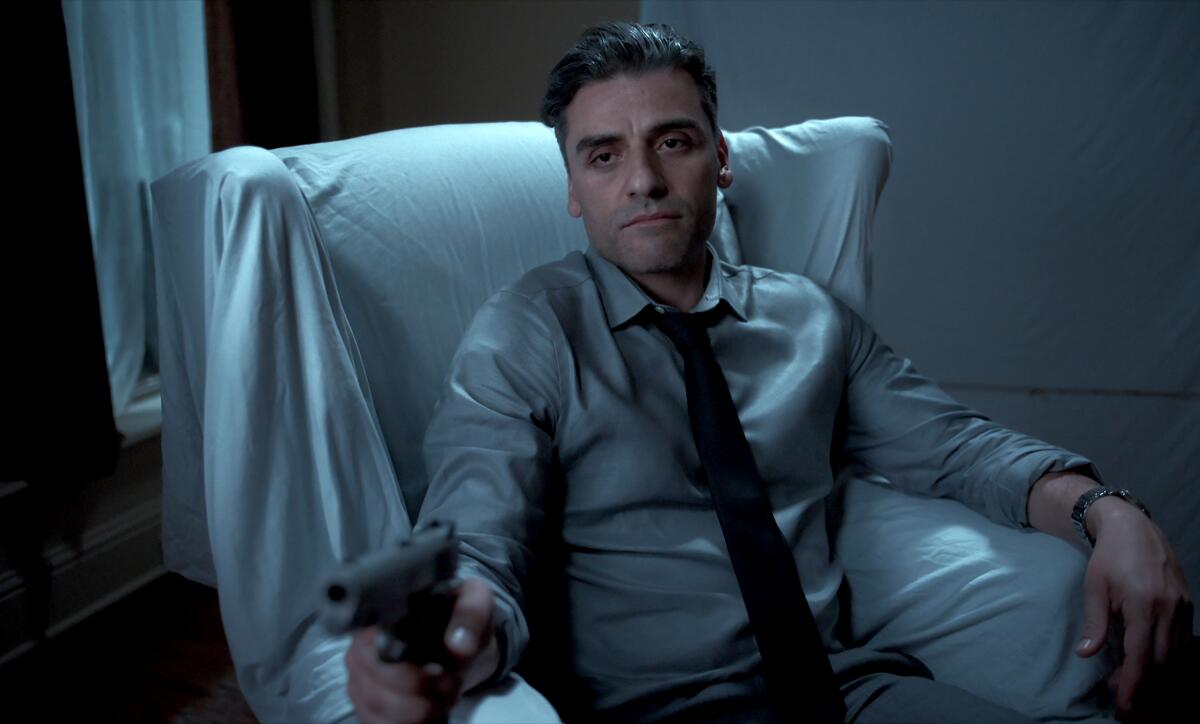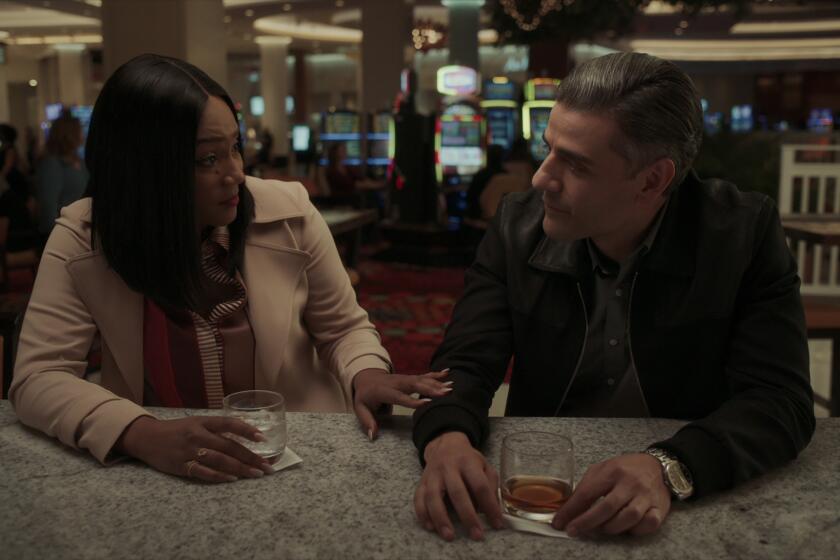Review: Oscar Isaac gives a one-of-a-kind performance in Paul Schrader’s ‘The Card Counter’

- Share via
The Times is committed to reviewing theatrical film releases during the COVID-19 pandemic. Because moviegoing carries risks during this time, we remind readers to follow health and safety guidelines as outlined by the Centers for Disease Control and Prevention and local health officials.
The nightmarish scenes of Abu Ghraib that punctuate “The Card Counter,” another long, dark night of the masculine soul from the writer-director Paul Schrader, look as warped as the images you might see in a funhouse mirror, minus the fun. Equipped with a disorienting wide-angle lens, the camera takes us on a tour of these hellish environs, drifting through grotty cells where naked prisoners crouch in helpless terror, caked with their own filth. At one point one of their American captors (played by Oscar Isaac) enters the frame, his figure so distorted that he appears to be cut off at the knees. Nothing else in the movie is shot like this; what we’re seeing is a visual aberration as well as a moral abomination.
These images are long-ago memories that continue to haunt Isaac’s character — he’s the card counter of the title, a professional gambler who calls himself William Tell. Years before he acquired that amusing pseudonym, he was a soldier stationed at Abu Ghraib, where he participated in the torture and interrogation of prisoners. Eventually he was court-martialed and incarcerated at Leavenworth, a rather nicer prison than his previous outpost; finding a strange comfort in life behind bars, he read books, broadened his mind and learned to count cards. Now back on the outside, William spends his days hopping from casino to casino, playing just skillfully enough to beat the house without cleaning it out. The routine suits him and keeps him busy. His demons have never left, but he’s holding them at bay.
Schrader, being Schrader, means to draw those demons back out into the open, to put his gravely conflicted antihero through his own intensely personal yet oddly familiar stations of the cross. Like some of the filmmaker’s other charismatically brooding sinners — Willem Dafoe’s crisis-ridden drug dealer in “Light Sleeper,” Ethan Hawke’s climate-conscious minister in “First Reformed” — William likes to sit alone in his room at night, nursing a glass of booze and pouring his dark thoughts into a handwritten diary from which he reads a few helpful expository excerpts. But for all these kindred spirits, William also stands apart, as does Isaac in one of his richest, subtlest performances.

Like any good card player, William is an astute observer of details, and Isaac’s coolly magnetic gaze has a way of heightening your own powers of concentration. You take in every detail of his appearance — the shocks of gray in his slick black hair, the crisp shirt-and-tie-and-leather-jacket ensembles — and are by turns seduced, intrigued and disturbed by the picture of self-imposed order that he projects. Whenever William checks into a new motel, he meticulously wraps every piece of furniture in a white sheet, draining the room of color. Is he trying to re-create the cold, comforting austerity of Leavenworth, or to literally blot out the messiness of his past? It’s not entirely clear.
What is clear is Schrader’s devotion to his own tropes, which will strike his critics as repetitive and his admirers as suitably ritualistic. But the filmmaker, coming off the remarkable career high of “First Reformed,” is skilled enough to find fresh emotional notes and subtle thematic variations in his template. There is something faintly amusing about the way Schrader assigns his characters their specific obsessions and neuroses, as if he were pulling topic cards at random out of a hat, but he gives those topics both dramatic weight and ethical consideration. He has a lot on his mind here — the history of the Hollywood gambling picture, the lingering moral taint of America’s post-9/11 war crimes — but he also wants to tell a good story, to leaven this harrowing odyssey with crackling moments of wit, levity and romance.
And in this he more than succeeds. The characters we meet along the way may fit archetypal slots, but they are inhabited with an intelligence and conviction that’s impossible not to take seriously. As William makes his way across the flat, depressing landscapes of America’s casino belt, he encounters two people who will change his life forever. One is a gambling agent, La Linda (a whip-smart Tiffany Haddish), who’s impressed by William’s poker skills and tries to persuade him to join her generously (and anonymously) funded stable of players. From the way William and La Linda lock eyes and trade quips, it’s clear that their interest may go beyond the strictly professional, a dramatic chip that Schrader waits to cash in at just the right moment.
The other key figure is a recent college dropout, Cirk (Tye Sheridan), whose name is pronounced “Kirk” and whose mind is consumed with revenge. Cirk’s father, like William, was once stationed at Abu Ghraib, where both men were trained by a sadistic superior, Maj. John Gordo (Willem Dafoe, a frequent Schrader collaborator). While William went to prison and Cirk’s father ultimately killed himself, Gordo managed to slip away and reinvent himself as a private security contractor. Now Cirk wants William to help bring Gordo to justice, a scheme that the shrewd gambler sees for the terrible idea it is.
Oscar Isaac and Tiffany Haddish have an electrifying chemistry in Paul Schrader’s dark drama ‘The Card Counter,’ which finished filming during the pandemic.
Hoping to dissuade Cirk, William takes him under his wing and drags him along on his casino tour. He also accepts La Linda’s invitation to the big leagues, hoping that his winnings will help the kid get back on his feet. A friendship blossoms, nourished by Isaac and Sheridan’s winning rapport. For William, Cirk is a source of affection and mild exasperation, but also an opportunity to do some good in a world he’s made demonstrably worse. But Cirk is also the latest warning of many in Schrader’s long, erratic and never-uninteresting filmography — going as far back as “Hardcore” and his script for “Taxi Driver” — that there are few things more dangerous or crushing than a wayward young soul in need of rescue.
In tracing this idea to its grim conclusion, “The Card Counter” doesn’t escape a certain diagrammatic neatness. Schrader’s moral inquiry hinges, as usual, on a semi-successful emulsion of narrative contrivance and philosophical seriousness. Sometimes a line will land a little too emphatically, especially when it’s trying to seem off-the-cuff. Consider it all part of the movie’s buy-in; it’s worth it. Scene by scene, it pulls us into a world that coheres not just through plotting and dialogue, but through the sharp rhythms of Benjamin Rodriguez Jr.’s editing, the hard shimmer of Alexander Dynan’s images and the humdrum precision of Ashley Fenton’s production design. Schrader achieves a richly atmospheric portrait of the poker tournament circuit, where the whir of roulette tables is interrupted by the whoops and hollers accompanying some of the game’s more flamboyant celebrities.
If the casinos constitute William’s own ugly-carpeted purgatory, he seems no less trapped by an outdoor suburban wasteland of strip malls and motel swimming pools; the America in whose name he committed unspeakable crimes looks none too beautiful. But there is one exception, a sequence that stands out like a beacon, when La Linda takes William to the illuminated Missouri Botanical Garden, flooding the screen with dazzling, vibrant colors that seem to accentuate Isaac and Haddish’s irresistible interplay. It’s not the first time Schrader has reminded us that beneath his austere rhythms and fatalistic journeys beats the heart of a true romantic, someone who sees in love the possibility of risk and redemption.
Director Paul Schrader needed five days to finish shooting “The Card Counter.” Plus a shave for Oscar Isaac, who stars with Tiffany Haddish. How he did it.
‘The Card Counter’
Rating: R, for some disturbing violence, graphic nudity, language and brief sexuality
Running time: 1 hour, 50 minutes
Playing: Starts Sept. 10 in general release
More to Read
Only good movies
Get the Indie Focus newsletter, Mark Olsen's weekly guide to the world of cinema.
You may occasionally receive promotional content from the Los Angeles Times.












